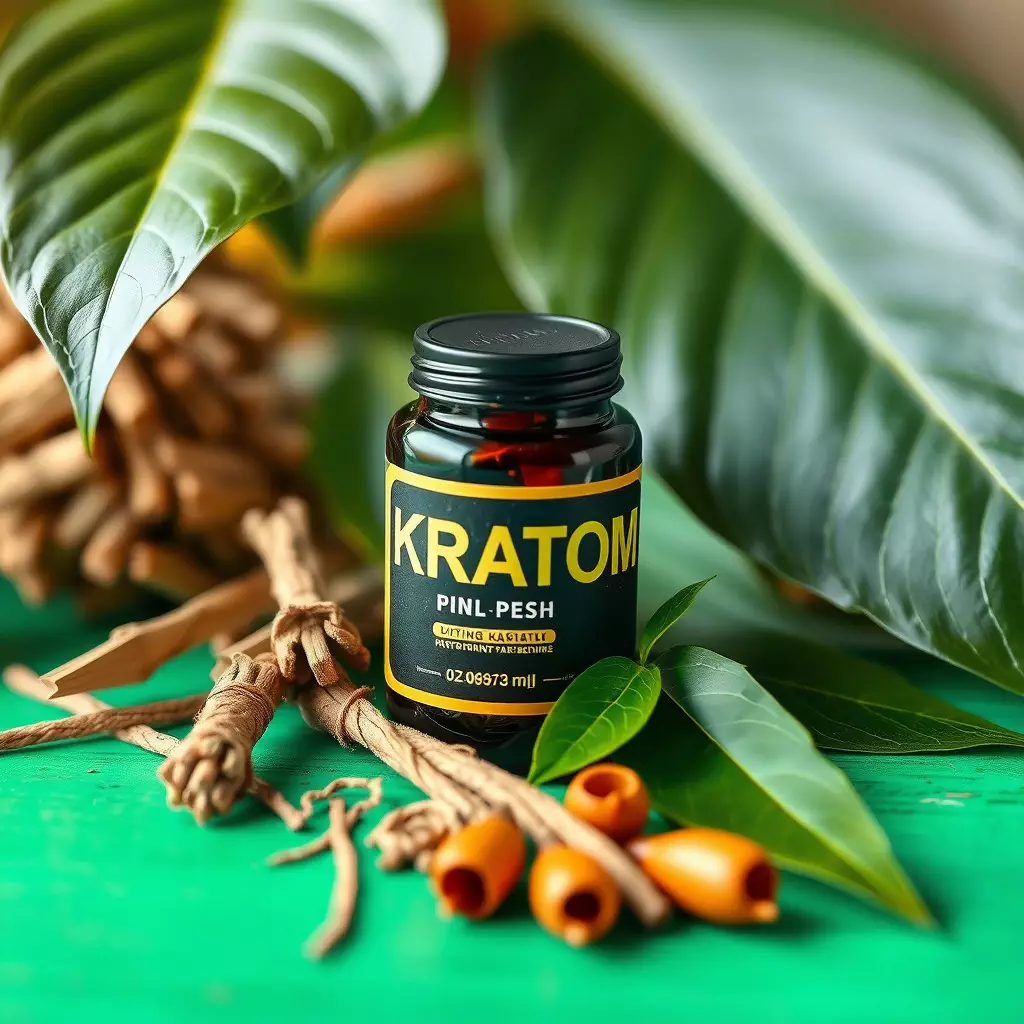Green Hulu Kratom Extract, a potent form of the kratom plant, is known for its unique alkaloid profile that offers both energy and mood enhancement. Sourced from Indonesia, it is favored for its balanced effects and minimal anxiety inducement compared to high-caffeine substances. While kratom, including Green Hulu Kratom Extract, is federally legal in the U.S., its legality varies by state, with specific regulations in West Virginia. In this state, kratom is legal but is subject to restrictions such as bans on sales to minors and strict oversight by the Department of Health and Human Resources to prevent misrepresentation. Users and retailers must stay informed about the evolving legal status of kratom in West Virginia, as laws can change with legislative updates and scientific research. Safety is paramount; users should start with a low dose due to the extract's potency, monitor their health for side effects like nausea or constipation, and be aware of potential withdrawal symptoms after prolonged use. It's also essential to avoid combining Green Hulu Kratom Extract with other substances to prevent harmful interactions. For those considering its use, professional medical advice is strongly recommended, especially for individuals with pre-existing health conditions or those on medications. Regular health monitoring and adherence to safety guidelines are crucial for a safe and responsible experience with Green Hulu Kratom Extract.
Green Hulu Kratom Extract has garnered attention within wellness circles, its unique alkaloid profile offering a blend of stimulating and relaxing effects. As interest grows, so does the need for clear guidance on its potency and uses. This article delves into the intricacies of Green Hulu Kratom Extract, providing insights on its effects and safety considerations for users. Additionally, it addresses a pressing concern: “Is Kratom legal in West Virginia?” We explore the complex legal landscape surrounding kratom use in the state, offering clarity on regulations and their implications for consumers. Whether you’re new to the world of kratom or a seasoned user, this comprehensive guide aims to equip you with essential knowledge.
- Unraveling the Potency of Green Hulu Kratom Extract: A Comprehensive Guide
- Legal Landscape of Kratom Use in West Virginia: Understanding State Regulations and Implications
- Effects, Uses, and Safety Considerations for Green Hulu Kratom Extract Users
Unraveling the Potency of Green Hulu Kratom Extract: A Comprehensive Guide

Green Hulu Kratom Extract, derived from the leaves of Mitragyna speciosa, is a potent variant that has garnered attention within botanical supplement circles for its unique blend of alkaloids. This particular extract is named after the region in Indonesia where it’s traditionally sourced and is recognized for its stimulating and mood-enhancing properties. The alkaloid profile in Green Hulu Kratom Extract is distinct from other strains, contributing to its efficacy and the array of effects users may experience. Users often report a balanced blend of energy and focus without the jittery sensation associated with high-caffeine products.
When considering the potency of Green Hulu Kratom Extract, it’s important to understand the context of its legal status. For instance, is kratom legal in West Virginia? The legality of kratom varies by state, and as of the knowledge cutoff date, kratom is legal at the federal level but subject to state-specific legislation. In some states, including West Virginia, certain forms of kratom may be restricted or regulated. Users should always verify the current legal status of kratom in their specific location before purchasing or consuming any kratom products. Additionally, due to the variability in alkaloid concentration between extracts and different batches, users are advised to start with a lower dose and carefully assess their response before considering an increase in dosage. This approach ensures a safe and informed exploration of the potential benefits that Green Hulu Kratom Extract has to offer.
Legal Landscape of Kratom Use in West Virginia: Understanding State Regulations and Implications

Kratom, a plant originating from Southeast Asia, has gained attention for its purported effects on energy, mood, and pain. In West Virginia, the legal status of kratom has been subject to scrutiny and change. As of the latest updates, kratom is not explicitly scheduled as a controlled substance at the federal level by the Drug Enforcement Administration (DEA), leaving states to determine their own regulations. In West Virginia, specific legislation addresses kratom. It’s legal in the state with certain restrictions; for instance, sales to minors are prohibited under state law. The West Virginia Department of Health and Human Resources oversees the regulation of kratom products, ensuring that they are not marketed as dietary supplements or for human consumption. This regulatory approach has implications for consumers and vendors alike, necessitating adherence to guidelines that dictate the legality and sale of kratom products within the state’s boundaries. It is imperative for both users and retailers in West Virginia to stay informed on these regulations, as changes in legislation or interpretations of existing laws can alter the legal landscape swiftly. Users must be aware that while kratom is not a controlled substance in West Virginia, its status may evolve with ongoing legal discussions and scientific research into its effects.
Effects, Uses, and Safety Considerations for Green Hulu Kratom Extract Users

Green Hulu Kratom Extract, derived from the leaves of Mitragyna speciosa, is a botanical product that has garnered attention for its potential effects and uses. Users often report that Green Hulu Kratom can promote a sense of well-being and energy. This particular strain is known for its balance between stimulating and relaxing properties, which may make it appealing to individuals seeking both a mental lift and stress relief. Its alkaloid profile, which includes mitragynine and 7-hydroxymitragynine, contributes to these effects. As with any supplement, the appropriate dosage is crucial; users should start with a lower dose to gauge individual sensitivity.
When considering the use of Green Hulu Kratom Extract, it’s important to be aware of its legal status. The legality of kratom varies by region, and as of the knowledge cutoff in 2023, is kratom legal in West Virginia? At the federal level, kratom remains uncontrolled; however, state laws can differ. In West Virginia, kratom is legally available, but its sale to minors is prohibited. Users in West Virginia and elsewhere should always verify current local regulations before purchasing or consuming kratom products. Safety considerations are paramount when using Green Hulu Kratom Extract. Potential side effects include nausea, constipation, and withdrawal symptoms when discontinued after regular use. It’s also not recommended for use with other substances due to the risk of adverse interactions. Users should consult with a healthcare provider before incorporating Green Hulu Kratom Extract into their wellness routine, especially if they have underlying health conditions or are taking other medications. Regular monitoring of one’s health and seeking professional advice are essential for safe usage.
Green Hulu Kratom extract offers a unique profile with potential benefits and effects that users should approach with cautious understanding, given its potency. As detailed in our comprehensive guide, the extract’s impact varies widely among individuals. It’s crucial for those considering its use to be well-informed about both its reported advantages and the safety considerations necessary to mitigate risks. On the legal front, as discussed regarding the is kratom legal in West Virginia question, users in this state navigate a complex regulatory environment that requires vigilant attention to stay compliant with local laws. Prospective users in West Virginia must be aware of the evolving legal landscape to ensure their use aligns with state regulations and the implications thereof. Ultimately, whether exploring its potential benefits or understanding its legal status, a balanced approach grounded in factual information is paramount.






